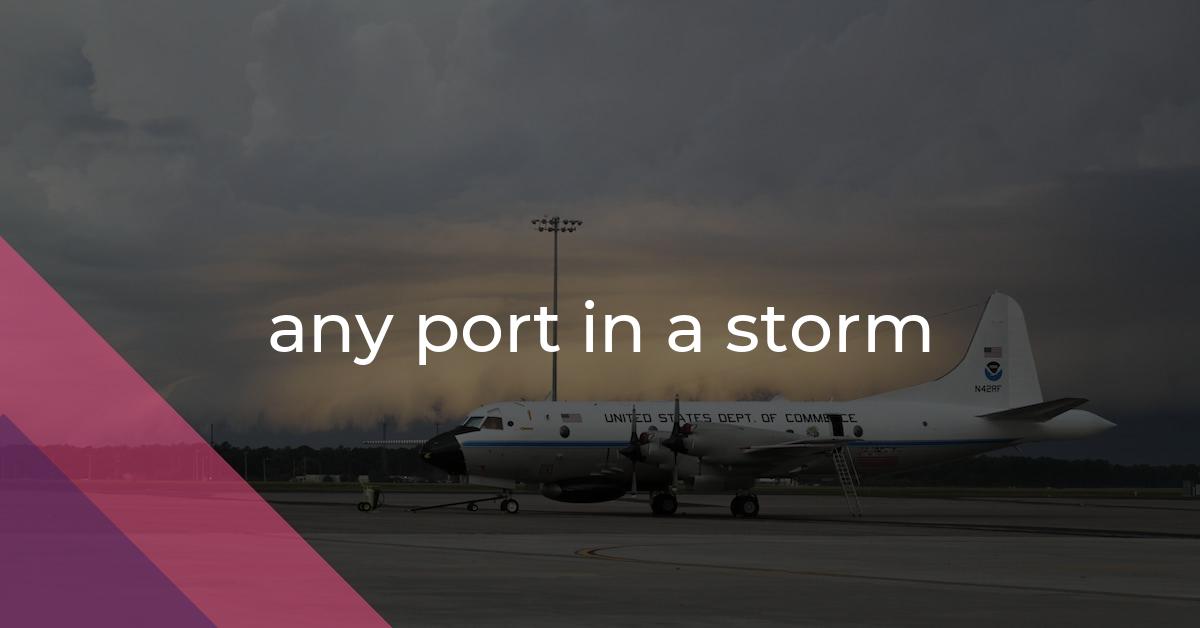any port in a storm: Idiom Meaning and Origin
What does ‘any port in a storm’ mean?
*any port in a storm* means that in difficult or desperate situations, a person will accept any help or opportunity that comes their way, regardless of its quality or desirability.

Idiom Explorer
The idiom "rain or shine" means that something will happen regardless of the weather or any other adverse conditions.
Meaning: When faced with a difficult situation or a shortage of resources, the phrase "in a pinch" means to manage or get by, even though it may not be the ideal solution.
The idiom "in any way, shape, or form" means absolutely no exceptions or possibilities. It emphasizes the complete absence of options or alternatives in a situation or action.
The idiom "hour of need" refers to a critical moment or a time when one is in desperate need of help or support.
"High and dry" is an idiom that means to be left in a difficult or helpless situation, especially without any assistance or support.
The idiom "grasp at straws" means to make a desperate attempt or effort when facing a difficult or hopeless situation, often by using any available option or possibility, no matter how unlikely or weak it may be.
This idiom means to adapt to a situation or circumstance without resisting or trying to control it. It implies going along with whatever is happening and not trying to change or fight against it.
An idiom that signifies something or someone considered to be a great blessing or stroke of luck, often seen as a divine or fortunate occurrence.
The idiom "fish in troubled waters" means to take advantage of a difficult or chaotic situation for personal gain or advantage.
Seeking Sanctuary
The idiom "any port in a storm" has been used for centuries and originated from the maritime world. It is often used metaphorically to convey a sense of desperation and the willingness to accept any solution in a difficult situation.
One interesting fact about this idiom is that it can also be used literally, referring to the practice of seeking refuge in any available port during a storm at sea. This emphasizes the importance of finding safety and protection even if it means accepting a less-than-ideal location. This practice dates back to the 17th century when sailing was a common mode of transportation and storms at sea were a significant danger.
Figuratively, the idiom is used to describe a situation where someone is facing a crisis and is willing to accept any solution, regardless of how undesirable it may be. It implies a state of urgency and the need to prioritize survival over aesthetics or preferences. The idiom suggests that when faced with a storm, one should prioritize finding any way out, even if it is not the perfect or ideal solution.
Furthermore, this idiom reflects a mindset that emphasizes practicality and adaptability. It highlights the importance of being resourceful and flexible in challenging situations. Sometimes, we need to set aside our expectations and consider alternatives that may not meet our ideal standards but can offer immediate relief or safety.
It is worth noting that this idiom is commonly used in English-speaking countries, including the United States. Its usage can be found in various contexts, such as personal conversations, literature, and even in journalistic writing. The idiom's popularity may stem from its simplicity, universality, and the relatability of its underlying message.
In addition to "any port in a storm," there are several related idioms that share similar themes of resilience and determination. One of these idioms is "come hell or high water." This idiom expresses a strong determination to overcome any obstacles or challenges, no matter how difficult or adverse the circumstances may be. It conveys a sense of unwavering commitment and the willingness to persevere regardless of the challenges that may arise.
Another related idiom is "come what may." This phrase expresses a similar sentiment of accepting and facing whatever difficulties or challenges may come. It reflects a mindset of being prepared for the unpredictable and being willing to confront and deal with whatever circumstances or obstacles may arise.
Similarly, the idiom "rain or shine" relates to the idea of facing and enduring challenging situations. It suggests a willingness to continue with a task or commitment regardless of the weather conditions or external factors that may pose obstacles.
These idioms, including "any port in a storm," "come hell or high water," "come what may," and "rain or shine," all share a common theme of resilience, determination, and the willingness to face and overcome challenges. They encourage a mindset of adaptability, resourcefulness, and the ability to prioritize survival or success over personal preferences or ideal solutions.
The idiom "any port in a storm" encompasses the idea of seeking refuge or accepting any available solution in times of crisis or difficulty. It originated from the maritime world but has been metaphorically embraced to address a broader range of situations. This idiom encapsulates the practicality and adaptability needed to navigate through challenging circumstances. By considering all available options, regardless of their desirability, one can increase their chances of survival and eventual success. While the origin and literal meaning are clear, the metaphorical usage continues to evolve, offering the possibility of further interpretation and exploration.
Example usage
Examples of how the idiom "any port in a storm" can be used in a sentence:
- When the car broke down in the middle of nowhere, they had no other option but to stay at the only motel they could find. It was a run-down place, but as they say, any port in a storm.
- During the heavy rainstorm, the hikers took refuge in a small cave they stumbled upon. They knew it wasn't ideal, but any port in a storm.
- After trying multiple job opportunities without success, he finally accepted a position that wasn't his dream job. He realized that sometimes you have to take any port in a storm until better opportunities arise.
More "Survival" idioms



